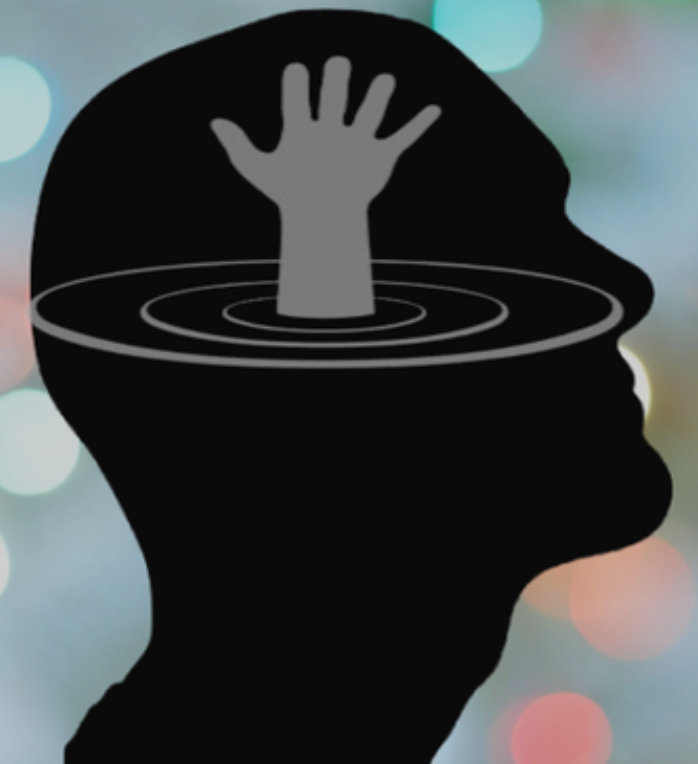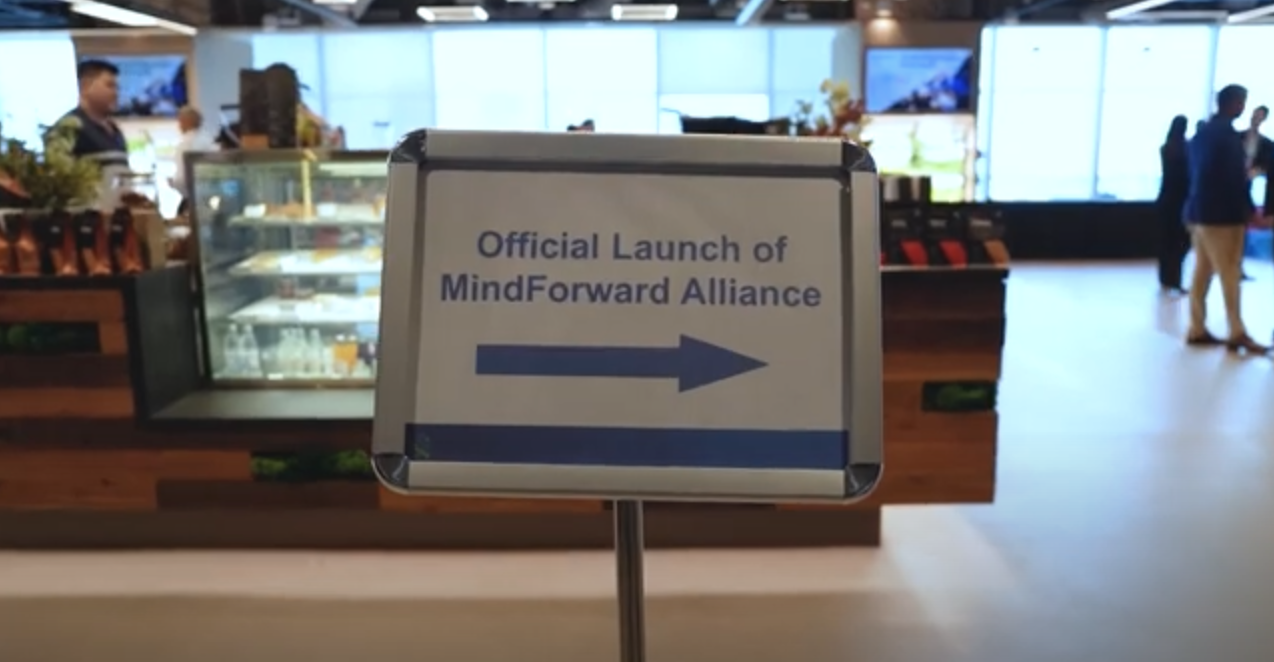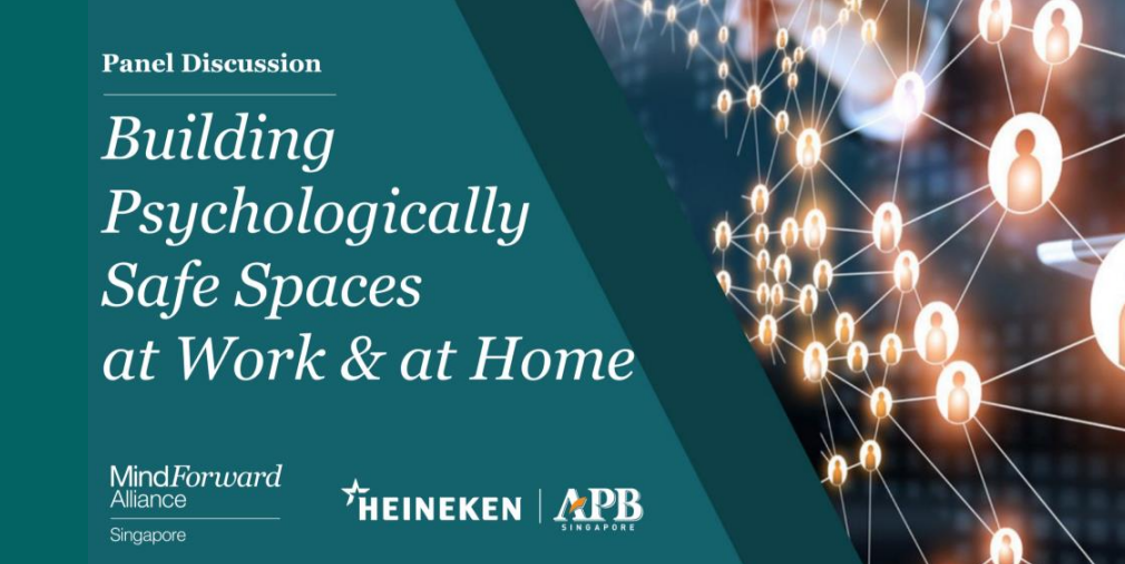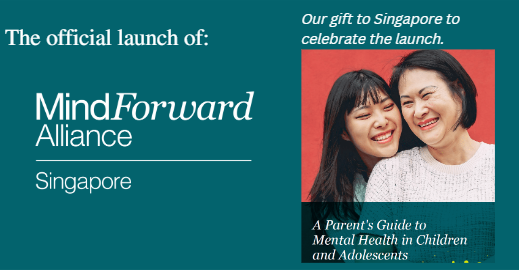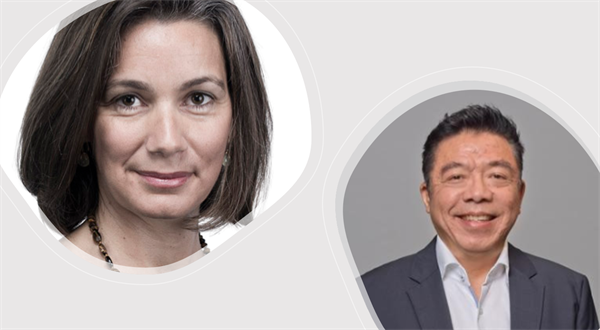Men's Mental Health
Asking for help is not a sign of weakness
Men are less likely than women to recognise the symptoms of a mental health condition, and those who do tend to be reluctant to acknowledge the issue. They tend to suffer in silence due to societal expectations and traditional gender roles.
Official Launch of MindForward Alliance Singapore
Official Launch of MindForward Alliance Singapore
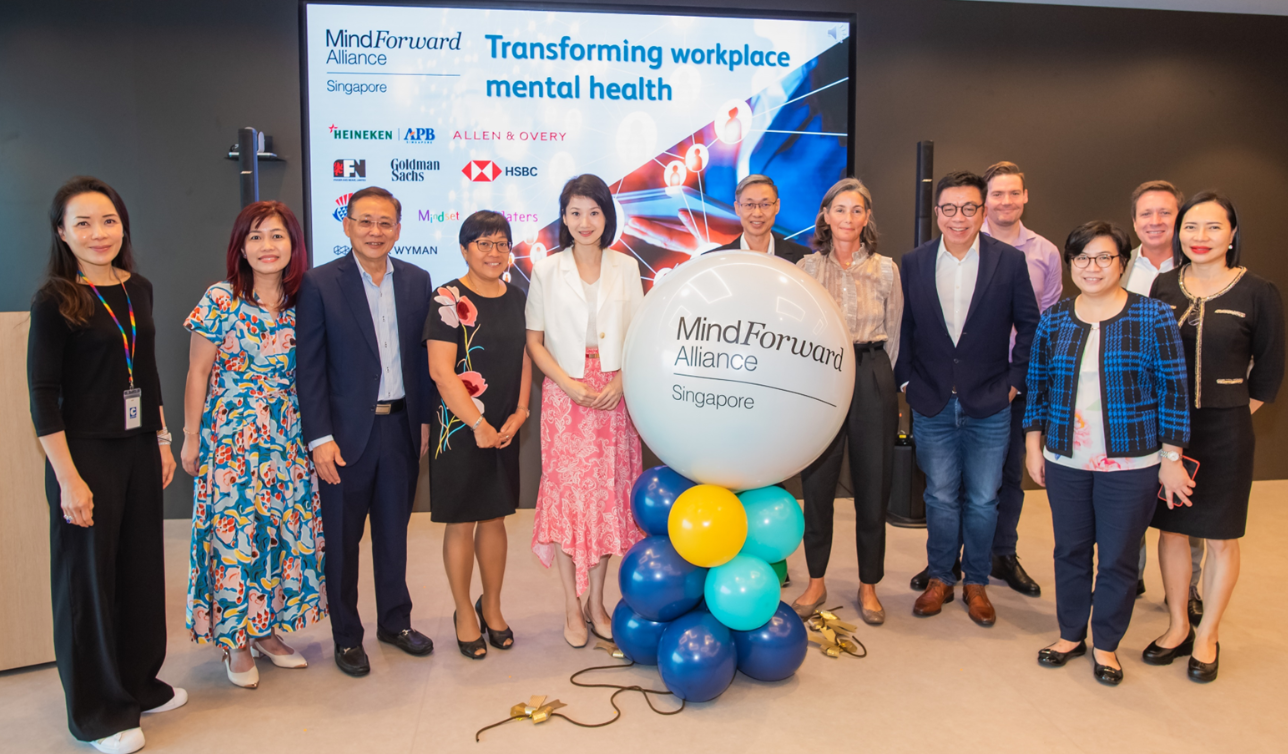
Photo: MOS Sun Xueling with MindForward Alliance Singapore Steering Committee & MD of APBS
MindForward Alliance Singapore, a not-for-profit membership organisation dedicated to transforming workplace culture into one that supports the mental health of its employees, is officially launched today.
Ms Sun Xueling, Minister of State in the Ministry for Social and Family Development & Home Affairs graced the launch event and unveiled the Parent’s Guide to Mental Health in Children and Adolescents.
We are the Singapore chapter of MindForward Alliance, a leading global not-for-profit organisation with a network of country chapters in the UK, Hong Kong, Australia, New Zealand, India, and Portugal. Our global footprint provides a rich environment to share best practices and case studies, perform benchmarking, conduct research, and develop a range of tools and services that are proven to work for business organisations.
The topic of mental health is coming to the forefront and more companies are increasingly seeing the need to take a holistic approach to promoting good mental health and well-being at workplaces. MindForward Alliance Singapore aims to be the catalyst for businesses to create mentally healthy workplaces in Singapore through the sharing of knowledge and real-world evidence, providing insights from experts, and offering practical support at both the operational and leadership level.
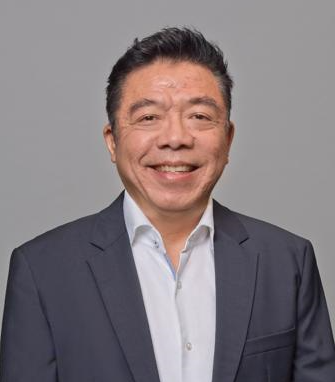
“MindForward Alliance Singapore is an exchange of reliable mental health practices, bringing the best from global companies and promoting the best of Singapore companies’ practices to the rest of the world. We help businesses benchmark areas of mental health management and awareness, while providing them with a more objective and structured look at developing opportunities or validating their strengths. More importantly, we empower business leaders to take bold actions to care for their team and transform the mental health agenda beyond their own workplace culture,”
Kenneth Choo, Co-Chair, MindForward Alliance Singapore
Launch of Parent's Guide to Mental Health in Children and Adolescents

To mark the official launch, MindForward Alliance Singapore, unveiled a Parent’s Guide to Mental Health in Children and Adolescents and presented it as a gift to Singapore. This guide was produced with Asia Pacific Breweries Singapore as the main contributing partner and drawing on the knowledge of social service agencies and mental health professionals in Singapore.
The Parent’s Guide is a first of its kind in a sense that it is a one-stop resource that’s all- encompassing and designed to cover 3 main topics:
- Empower working parents with the knowledge and resources to identify and address mental health difficulties in their children. In addition, links to local resources and treatment plans that they could rely on are also covered.
- Support parents and caregivers by giving tips about how to make self-care a priority.
- Inspiring business leaders and HR practitioners with real business cases that 4 of our members are practicing making the workplace a better place for their people.
“It can be worrying and stressful for any parent or caregiver to see their child experiencing difficulties with their mental health, which in turn reduces the productivity and performance of the working parent. Businesses have a responsibility to transform their workplace culture into one that makes working parents feel supported. With this mental health guide, we hope to inspire business leaders to transform mental health discussions into mental health actions to improve the well-being of their employees and build a compassionate and thriving workplace,”
Laure de Panafieu Co-Chair, MindForward Alliance Singapore

Building Psychologically Safe Spaces at Work & Home
Psychological safety is essential for fostering a mentally healthy workplace and home environment in which people can thrive.
The Official Launch of MindForward Alliance Singapore
Welcome to the launch of MindForward Alliance Singapore & the presentation of our Parent’s Guide to Mental Health in Children & Adolescents
CMHA Singapore: Managing Pandemic Anxiety
CMHA Singapore recently held an event with Project Green Ribbon exploring how people can manage anxiety due to the pandemic.
Earlier in June City Mental Health Alliance Singapore (CMHASG) and Project Green Ribbon (PGR) organised a webinar, with Dr Jasmine as the speaker, on the topic of Facing Pandemic Anxiety.
Here are some key takeaways:
There is a difference between our normal anxious feeling and this pandemic anxiety.
The normal anxious feeling is like an overprotective alarm system that sometimes blasts at us with what ifs, worst case scenarios and negative beliefs. This pandemic anxiety is different. It is not just feeling uncertain or negative belief, it is real. We see people dying, the virus spreading, lives affected, we are isolated, experienced financial stress and grieved of loss of routine etc. It caused us to be scared of the future more than just being worried about the future.
Why is it important to feel safe?
Feeling safe is important as it gives you the sense of security, stability and in a good place. Anxiety comes when you do not feel safe.
Coping with this pandemic
The pandemic uncertainty caused us to feel anxious. Unlike other uncertainty we faced, it is totally new, unknown and unpredictable. In this Phase 2 Heighten Alert (P2HA) in Singapore, many felt a greater heaviness because we went from hopeful (after seeing a decline in cases, and progressive roll out of vaccinations) to disappointment when the cases shot up and we were put under P2HA.
It is better to reflect on how we had managed and overcome the challenges so far instead of asking how to deal with tomorrow. It gives us more assurance and helps us feel safer to handle the unknown ahead of us.
Another technic is to reframe our thinking. Instead of thinking or saying we are struggling or suffering, say we are conquering and overcoming.
What should I do when I feel mentally tired, moody, irritable, and emotionally low?
This could be due to the over exposure to social media and the news. When your mind constantly filters what is real or fake, or things are looking better or worse, it will be exhausted. Limit your time on reading news on Covid and restrict your visit only to websites providing reliable sources of info.
This is what you can do to manage anxiety:
1) Have a routine . Establish a daily ritual and a day to day routine. It gives us the feeling of being in control and remove the feeling of uncertainty.
2) Manage our attitude
Live by hope and not by fear. Hope is one emotion that keep us going. Many people because of disappointment dare not hope again. We can create as many small things to be hopeful for.
Rest. Have adequate sleep. Rest is when work or movement ceased.
Relax. Relax is having downtime. Different from rest. Relaxation is the mind’s way of rejuvenating, occurs while we are awake.
Being in control will bring the sense of safety and security.
Thank you to Dr Jasmine Badge for sharing her experience.
You can watch the event here.
CMHA Singapore – part of the start of a national conversation
Laure de Panafieu and Kenneth Choo talk about the galvanising effect of the pandemic and how the Singapore Chapter is helping to break down stigma.
When the City Mental Health Alliance (CMHA) was established in the UK in 2012, its founding members were pioneering firms who had recognised the business critical need to prioritise their people’s mental health. The Covid-19 pandemic has been a rude awakening to this need. It has accelerated the conversation elsewhere in the world too, and the CMHA has been invited by nations’ business communities to spearhead their efforts.
Laure de Panafieu is a Partner at global law firm Linklaters and has actively sponsored CMHA Singapore since it launched during the height of the Covid-19 pandemic. Kenneth Choo is Managing Director of Heineken Asia Pacific and he and Laure were appointed co-Chair of CMHA Singapore in 2021. They spoke to us about the galvanising effect the pandemic has had, and how the Chapter is helping to break down stigma in Singapore.
What effect has the Covid-19 pandemic had on awareness of workplace mental health in Singapore?
Kenneth: “The pandemic was really an eye-opener for us in Singapore. It made us realised the importance of mental health. Covid-19 struck and people started to realise working from home and the stress is of a really different level not experienced before at a workplace.”
Laure: “Covid-19 has thrown all of us into a new world of work, with remote working having become the new norm overnight, and giving rise to various challenges, such as the blurring of boundaries between home and work, the challenges posed to teamwork and collaboration, and more fundamentally, heightened risks of isolation and burnout.”
How has CMHA Singapore been able to encourage this important new topic of conversation?
Kenneth: “Amongst the members, we shared and increase our awareness of mental health development at the workplace We shared our experience and learn from both the global network and from each other. Having a community, especially those that have gone ahead of us, to actually share and put questions to.
“The credibility and the reputation of the companies in the alliance gives us the comfort that we are on the right track. Heineken is really a new member to this chapter, and we are one of the ones that wanted to join and learn from this. It’s really safety in numbers.”
Laure: “I spent the first 12 years of my career in our London office, and over that period, I witnessed a real shift towards mental health related discussions, allowing for better awareness, understanding and critical medical and emotional support to be at hand, where needed. When I moved to Asia in 2011, mental health was just not on any visible radar. And I quickly realised that the stigma around this topic in this part of the world remained very strong and omnipresent, meaning that medical and psychological support was either rarely sought, or too late, let alone available at all, unsurprisingly contributing to the severe and long-lasting effects of underlying mental illnesses. In that context, as leaders, it is absolutely imperative that we do our part to break the stigma and lead by example in starting conversations, showing our own humanity and vulnerability to create a safe and caring environment for all. Being part of CMHA provides us with a fantastic head start in Singapore, allowing us to leverage on all of the tools and equipment that have been built and refined by the broader network over the years, adapting them, as needed, to appropriately fit the pace and starting point of Singapore’s conversations.
What would you say to business leaders in Singapore who haven’t yet prioritised the mental health of their workforce?
Laure: “In short, leaders cannot drive strong, sustainable, and long-lasting business results and performance without a strong and effective team. To achieve this, our people need to know and believe that we care about them that we are truly and genuinely attentive to their well-being and that our actions match our speech. In high-performing environments, mental health risks are very real and need to be recognised and properly addressed. Creating that safe space is fundamental to create a thriving business for the long term. To me, being an effective and inspiring leader has to start by being brave enough to embrace vulnerability and face these difficult conversations.”
Kenneth: “Indeed, have a psychologically safe environment encourages people to talk about it and promotes positive mental health development, and ultimately, happiness at work. We are all aware that with better mental health, our employees’ productivity will also increase. For business leaders this is really a platform for you to show your authenticity, show your empathy, and practise active listening from your people about their work-life balance.”
Why does the mental health agenda matter to you?
Laure: “When I became a partner at Linklaters in 2017, I was in awe at the courage shown by our senior leadership, well before the COVID-19 pandemic gave mental health its seat at the table, in placing mental health on the agenda at our global annual partner conference. I vividly remember the very emotional and personal stories shared by some of our leaders, in front of a +400-partner audience. In a high performing environment where excellence, pushing the boundaries and over-achievement are part of our daily job showing any kind of weakness is highly counterintuitive. Those poignant stories were incredibly valuable in reminding all of us that we needed to open up about our own struggles in order to overcome them together, and that we were stronger, not weaker, in doing so.
“I was so inspired that I decided to lead our own mental health initiatives in Singapore, embracing that vulnerability by sharing my story, alongside those of some of our leaders in the region, as the first of many initiatives that have since followed. Looking back, our work has been instrumental in breaking the stigma around mental health and creating a safe environment for our people in Singapore and other parts of the network and, whilst the COVID-19 crisis has thrown all sorts of new challenges on this front, the foundations we have built will enable us to tackle those better, together..”
Kenneth: “One of my personal purposes is to make people happy, At the workplace, stress level is increasing, exasperated by Covid-19 and other social-political-financial crisis. The stress easily converts into self-doubts and fear. When we are able to have real conversations, we will be able to conquer the fear, and turn it into care, encouragement and energy to move forward. If we succeed in creating a safe environment at the workplace, we will be on track towards a happier life.”
Resources
CMHA Singapore


